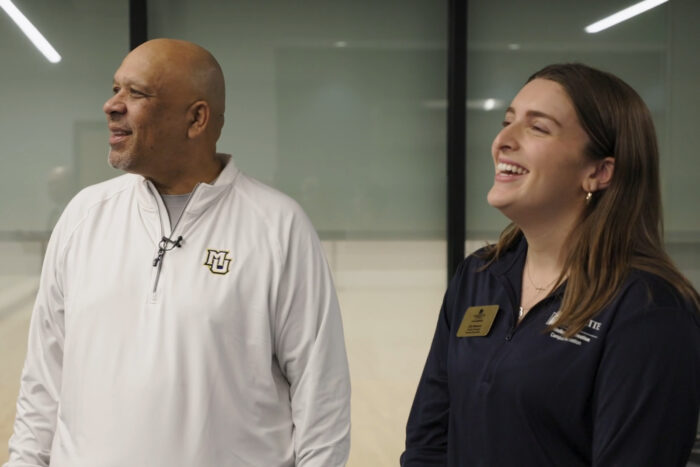In an effort to promote research and scholarship conducted by Marquette faculty and staff, the Office of Marketing and Communication and the Office of Research and Sponsored Programs have partnered to present a monthly recap of recent grants awarded to faculty and staff.
This report will be featured in Marquette Today each month.
The following grants were awarded to university faculty and staff in December 2019:
Effects of visual feedback on balance control in people with multiple sclerosis
$25,000 – Alvin and Marion Birnschein Foundation
- Scott Beardsley, associate professor of biomedical engineering (PI), and Dr. Brian Schmit, professor of biomedical engineering, in the Opus College of Engineering; and Dr. Allison Hyngstrom, chair and associate professor of physical therapy in the College of Health Sciences.
- Abstract: The team’s recent findings show that movement of the visual scene in a virtual environment causes systematic changes in balance in persons with MS that differ from control participants. This research will attempt to demonstrate an increased reliance on visual systems for balance control in people with MS and identify how impairments in visual feedback decrease stability during standing and walking.
Stormwater pollution: can we observe it better from the sky?
$25,000 – Lafferty Family Foundation
- Walter McDonald, assistant professor or civil, construction and environmental engineering in the Opus College of Engineering.
- Abstract: Stormwater runoff that transports pollutants across urban land surfaces is a significant threat to human and environmental health; however, no methods exist to observe pollution concentrations on urban land surfaces at high-spatial resolutions. Therefore, this project seeks to meet this gap by applying multispectral imagery captured by a drone to estimate pollution concentrations on urban land surfaces.
Designing hybrid courses for the Educational Administration program
$5,000 – Myers Family Foundation
- Leigh van den Kieboom, chair and associate professor of educational policy and leadership in the College of Education.
- Abstract: Online-hybrid program delivery has been embraced as a viable model for effective graduate education. Faculty in the College of Education’s Educational Administration program would like to respond to these market changes by developing online-hybrid courses to meet the growing demand for this type of delivery. The purpose of the EDAD program is to prepare educational leaders (principals) for public, Catholic and independent private schools.
Integrating multi-omics datasets to predict patient-specific drug response
$12,500 – Medical College of Wisconsin (CTSI)
- Serdar Bozdag, associate professor of computer science in the Klingler College of Arts and Sciences.
- Abstract: The overarching goal of Bozdag’s lab is to develop a computational tool that integrates multi-omics biological, pharmacogenomics, clinical and exposome datasets to predict patient-specific drug response. In this start-up project, they aim to develop a computational method to associate cell line-specific data to primary tissue-specific data to assess the usability of cell line-specific drug response data to predict patient-specific drug response.
RNA structure and mechanism of the cancer-associated antisense transcript derived from the tyrosine kinase containing immunoglobulin and EGF-1 gene
$12,500 – Medical College of Wisconsin (CTSI)
- Nicholas Reiter, assistant professor of chemistry (PI); and Ainur Abzhanova, graduate assistant in chemistry in the Klingler College of Arts and Sciences.
- Abstract: The goal of this pilot project is to determine the structural basis for RNA-mediated regulation of the tie1 mRNA, using nuclear magnetic resonance spectroscopy and biochemical approaches. Identifying the RNA-mediated regulatory mechanisms of tie1 gene will help us to better understand vascular assembly and better treat atherosclerosis and cancer-associated angiogenesis.
Marquette Energy Analytics: Research and internship project
$303,000 – Marquette Energy Analytics
- Richard Povinelli, associate professor of electrical and computer engineering in the Opus College of Engineering
- Abstract: This research and graduate internship program focuses on research in energy analytics in one or more of six research projects designated by Marquette Energy Analytics.
Novel Algorithm to increase anaerobic co-digestion renewable energy
$88,988 – Milwaukee Metropolitan Sewerage District
- Daniel Zitomer, chair and professor of civil, construction and environmental engineering (PI); Dr. Dong Hye Ye, assistant professor of electrical and computer engineering; and Kaushik Venkiteshwaran, postdoctoral fellow in civil, construction and environmental engineering in the Opus College of Engineering.
- Abstract: The ease with which a digester produces methane from a new co-digestate is a function of the identity and number of the microbes in the digester. The exact microbes in a digester affect biogas production. When adding a new waste to digesters, anaerobic digestion could be unstable if the right microbes aren’t present. To account for this, and predict the extra methane produced from co-digesting new wastes, the team proposes to develop a novel computer algorithm to predict methane production rates using digester microbial community data.
Technology development and demonstration of Grit Assisted Patch: Improvement and field test
$92,977 – Milwaukee Metropolitan Sewerage District
- Baolin Wan, associate professor of civil, construction and environmental engineering in the Opus College of Engineering.
- Abstract: Wastewater grit is a major byproduct from preliminary municipal wastewater treatment and MMSD landfills approximately 1,400 tons of grit annually. In a previous project, “Grit Assisted Patch for Milwaukee Pothole Fast Repair,” this research team proposed a concept of grit assisted patch. In this project, the GAP properties will be improved, while its practical properties and performance on the road in real traffic will be evaluated. Refining economic analysis and assessing environmental impact between GAP and conventional patches will be performed to evaluate its broader impact.
Understanding microbial community dynamics of activated sludge to predict and mitigate foaming events
$93,035 – Milwaukee Metropolitan Sewerage District
- Patrick McNamara, associate professor of civil, construction and environmental engineering (PI); Dr. Daniel Zitomer, chair and professor of civil, construction and environmental engineering; and Kaushik Venkiteshwaran, postdoctoral fellow in civil, construction and environmental engineering in the Opus College of Engineering.
- Abstract: Microbial communities are integral to wastewater biological treatment processes. They both contribute to the functional success of treatment processes and cause process upsets. This research team hypothesizes that, through frequent sampling, it can develop a quantitative relationship between specific microbes and foaming events in activated sludge.


